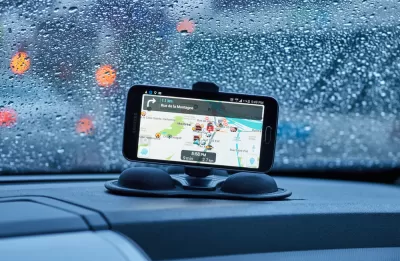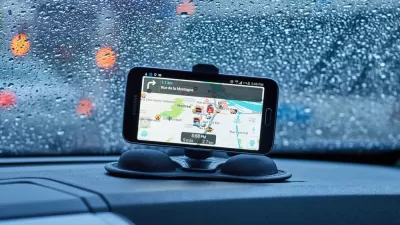Accounts of disgruntled residents responding by any means necessary to the flood of cars beckoned by the whims of navigation apps like Waze are spreading across the country.

Steve Hendrix reports on the ongoing battle between residents of residential streets and navigation apps like Waze. Hendrix specifically cites the example of Timothy Connor, who lives in Takoma Park, Maryland and has become so frustrated by the number of cars on his street as a result of a nearby street repair.
Hendrix reports that Connor "borrowed a tactic he read about from the car wars of Southern California and other traffic-weary regions: He became a Waze impostor. Every rush hour, he went on the Google-owned social-media app and posted false reports of a wreck, speed trap or other blockage on his street, hoping to deflect some of the flow."
Eventually Waze discovered Connor's tactic and stopped registering his reports, "[making] Connor a casualty in the social-media skirmishes erupting across the country as neighborhoods try to contend with suddenly savvy drivers finding their way on routes that were once all but secret."
Hendrix looks around the country for more examples of the methods by which cities and residents are countering the traffic effects of navigation algorithms. Hendrix also reports Waze's response, both in suspending users suspected of "tampering with the map" and in adding new features to the app, like "alerts about school zones and other slow-speed zones…"
FULL STORY: Traffic-weary homeowners and Waze are at war, again. Guess who’s winning?

Montreal Mall to Become 6,000 Housing Units
Place Versailles will be transformed into a mixed-use complex over the next 25 years.

Planetizen Federal Action Tracker
A weekly monitor of how Trump’s orders and actions are impacting planners and planning in America.

DARTSpace Platform Streamlines Dallas TOD Application Process
The Dallas transit agency hopes a shorter permitting timeline will boost transit-oriented development around rail stations.

Interactive Map Reveals America's “Shade Deserts”
Launched by UCLA and American Forests to combat heat-related deaths, the tool maps the shade infrastructure for over 360 U.S. cities.

Bicycles and Books — In Sacramento, Libraries Now Offer Both
Adult library card holders can check out e-bikes and e-trikes for up to one week.

Colorado Landfills Emit as Much Pollution as 1M Cars
Landfills are the third-largest source of methane pollution in Colorado, after agriculture and fossil fuel extraction.
Urban Design for Planners 1: Software Tools
This six-course series explores essential urban design concepts using open source software and equips planners with the tools they need to participate fully in the urban design process.
Planning for Universal Design
Learn the tools for implementing Universal Design in planning regulations.
City of Mt Shasta
City of Camden Redevelopment Agency
City of Astoria
Transportation Research & Education Center (TREC) at Portland State University
US High Speed Rail Association
City of Camden Redevelopment Agency
Municipality of Princeton (NJ)



























